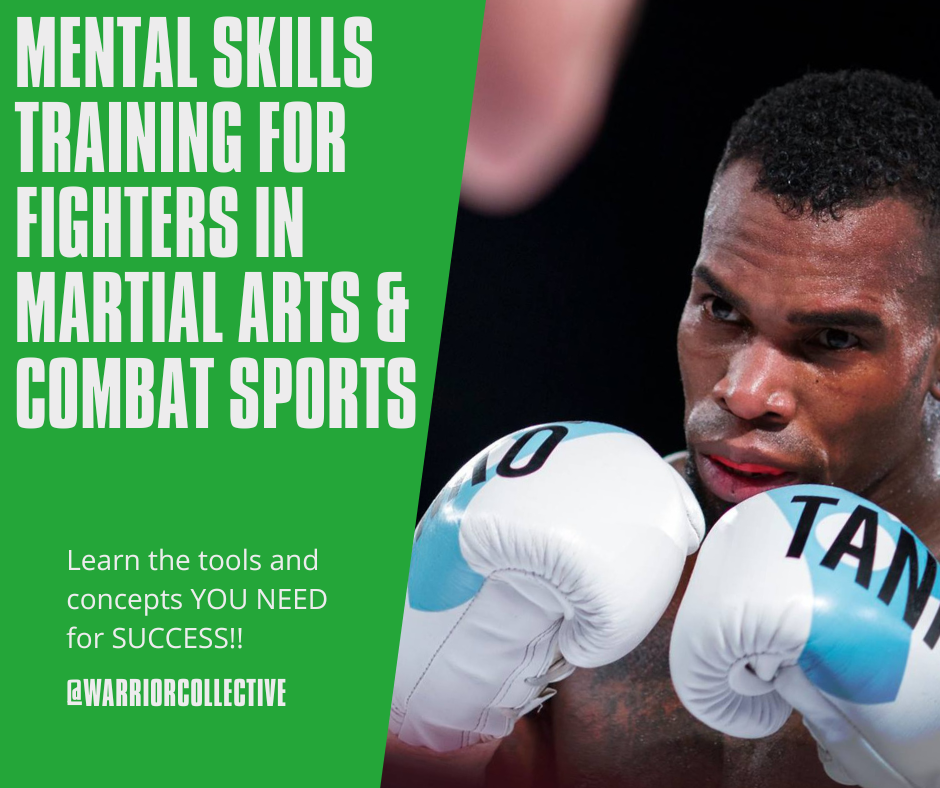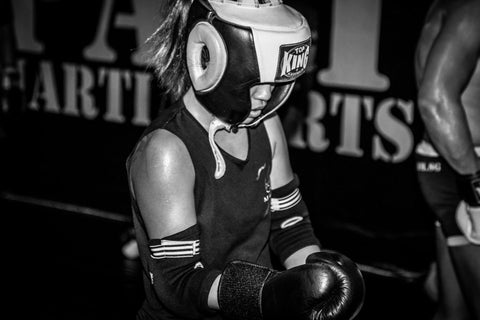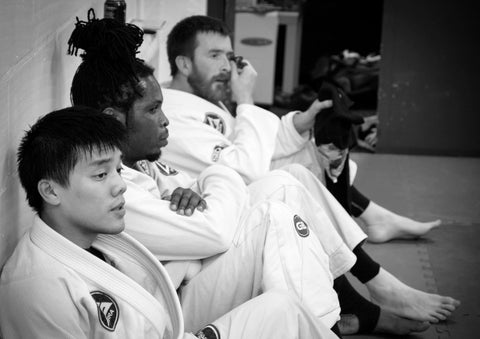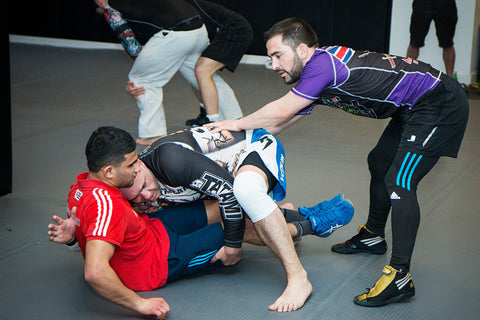
Mental Skills Training for Fighters in Martial Arts & Combat Sports
Through my #InsideChat podcast, I am able to personally speak with a wide range of leading figures from the world of martial arts, sports, psychology, sociology and nutrition on a regular basis. One such individual I had the pleasure of speaking to and learning from recently is internationally renowned sports psychologist and researcher Dr Mary Quinton. In this particular episode, we spoke about mental skills training for fighters needed for success in Martial Arts and Combat Sports.
Mastering the mental game is as critical in combat sports as physical conditioning and technical skills. Mental toughness separates the best from the rest, especially under pressure. In this comprehensive post, we’ll explore the essential mental abilities required to excel in martial arts and combat sports.
We uncover evidence-based strategies to build bulletproof mindsets. Core topics include:
- Fostering growth mindsets and resilience
- Developing self-awareness and self-regulation skills
- Using imagery to prepare, build confidence and focus
- Blocking out distractions and managing thoughts/emotions
- Setting process-oriented goals that optimise motivation
- Tailoring approaches across developmental stages
- Promoting empowering training environments
- Providing developmentally appropriate support and open communication
This extensive post aims to equip coaches, athletes, and parents with actionable advice to help build their understanding of mental skills training for fighters.

Mental Skills Training for Fighters
Cultivating a Growth Mindset and Resilience
Productive mindsets believe abilities can be developed rather than fixed. Dr. Quinton explains those with growth mindsets are more motivated to learn and bounce back from failures. They view challenges as opportunities to expand their skills rather than indications they lack natural talent. Growth mindsets promote resilience - the ability to persevere through setbacks on the path to improvement.
Coaches and parents should praise effort over outcomes, encourage experimentation and reinforce that mistakes are normal parts of progress. Getting fixated on results rather than the process of incremental growth is harmful. Fighters must remember bad days don’t define you. Refocusing on controllable actions, not comparing yourself to others, and celebrating small wins develops healthy, resilient mindsets optimised for the long-haul.
Developing Self-Awareness & Self-Regulation Skills
Performing under pressure requires managing thoughts, emotions and stress responses. Dr. Quinton advocates mental skills training to enhance psychological and emotional self-regulation. Techniques like imagery, self-talk, breathing exercises, and cognitive restructuring can be tailored to individual needs.
Stepping back and objectively observing your mental/emotional state builds awareness critical for self-regulation. Noticing early signs of unproductive thinking stops downward spirals. Dr. Quinton suggests accepting difficulties as normal rather than piling judgement on top. Labelling thoughts and emotions helps rationalise them. Training self-awareness and regulation prepares you to optimise mindset regardless of external circumstances.

Leveraging Imagery to Prepare, Build Confidence & Stay Focused
Imagery, also called visualisation, instils the vivid experience of executing techniques flawlessly or winning fights before stepping foot in the ring/cage. By mentally rehearsing and "pseudo-experiencing" desired outcomes, imagery builds confidence they can be achieved and creates neural pathways to support execution.
Dr. Quinton explains research shows different imagery approaches enhance performance/wellbeing. Visualising winning boosts confidence and motivation. Imagining feeling calm and in control regulates anxiety. Picture flowing through fight combinations to ingrain technique. Tailor imagery to what an athlete needs - pump up excitement or promote tranquility. Make mental rehearsal of the exact sights, sounds, emotions and sensations a regular training habit.
Blocking Out Distractions & Managing Unwanted Thoughts
A cluttered mind compromises focus and performance. Martial artists must screen out distractions, quiet inner noise and suppress intrusive thoughts that disrupt their flow. Attentional control separates the disciplined from the easily distracted.
Dr. Quinton suggests imagery and mindfulness practices to enhance concentration amid chaos. Mentally rehearse dismissing distractions and redirecting attention to proper technique and strategy execution. Label intrusive thoughts objectively and let them pass rather than ruminating. Refocus on tactical priorities, breathing, and being fully present. Developing attentional control allows you to dictate where mental energy flows, not external forces.
Setting Process-Oriented Goals for Optimal Motivation
The right goals provide direction and boost drive by fulfilling psychological needs for autonomy, belongingness and competence. Rather than broad outcomes, Dr. Quinton advocates specific, measurable process-oriented goals focused on strategies, efforts and incremental progress. These foster motivation better than results-based goals you only partially control.
A fighter might set a goal to land a certain number of leg kicks each round, or improve their takedown defence percentage over upcoming bouts. Smaller goals provide frequent feedback on growth to stay motivated. Coaches should collaborate with athletes to set appropriately challenging goals tailored to their level and needs. Focusing on the process of improvement keeps fighters continuously growing.

Tailoring Approaches Across Developmental Stages
While general principles apply broadly, mental skills training requires age-appropriate tailoring. Dr. Quinton notes brains don't fully mature until the mid-20s. So young athletes are still developing capacities like decision-making and emotional regulation. Coaches and parents should adjust expectations and scaffold learning accordingly.
Simpler techniques like imagery and self-talk may resonate better with youth. Teenagers benefit from open conversations validating their experiences and building emotional awareness. Avoid overloading youth with advanced methods or rigid competition goals. Ensure young athletes feel supported trying skills, making mistakes and learning how to reframe setbacks positively. Adapt methods to their developmental level.
Promoting Empowering Training Environments
An empowering motivational climate where athletes feel autonomous, competent and cared for is crucial for wellbeing and growth. Dr. Quinton advocates coaching that satisfies psychological needs by providing choice, optimally challenging skills, and encouraging supportive team bonds. Disempowering environments that control, criticise and isolate thwart these needs and hinder growth.
Coaches should give meaningful input while progressively transferring leadership to athletes. Caring about fighters as people enables trust and open communication. Dr. Quinton suggests asking athletes for training preferences, praising effort, and promoting collaborative goal-setting and bonding opportunities. Nurturing motivational climates breed intrinsically driven, resilient athletes.
Providing Developmentally Appropriate Support & Communication
Parents play a central role in promoting wellbeing and development through modelling resilience, providing support, and communicating openly. Dr. Quinton stresses parents should avoid pressuring children and make sure sport participation remains fun. Creating safe environments for youth to share struggles prevents small issues becoming major problems.
She advises carefully listening to validate children’s experiences, which builds trust, relatedness and willingness to discuss difficulties. Parents can check in about subtle emotional changes and educate themselves on youth mental health to provide knowledgeable guidance. While not expecting to “fix” problems, demonstrating care and directing youth to resources shows you take their wellbeing seriously.

Tailoring Mental Skills for Different Sports & Ability Levels
Dr. Quinton notes optimal training environments balance high achievement with wellbeing across participation levels. Elites face amplified pressure but can succeed despite mental health challenges with proper support. Beginners should focus on enjoyment, effort and growth.
Tailor approaches based on individuals’ needs and sport demands. Fighters benefit from arousal regulation to channel pressure productively. Racquet sport players may integrate attentional cues between points. Team players could focus on communication, bonding and resilience. While principles broadly apply, adaptation maximises benefits and transfers to competition.
Building Your Mental Skills Toolbox as an Athlete
Here are essential skills Dr. Quinton suggests fighters develop in their mental toolbox:
- Imagery - Visually rehearse executing techniques flawlessly and dominating fights.
- Attentional Cues - Trigger words that redirect focus from distractions back to tactical priorities.
- Mindfulness - Practice being fully mentally present and aware through breathing, sensation, emotions.
- Cognitive Restructuring - Identify and reframe unhelpful thoughts more constructively.
- Arousal Regulation - Control intensity of mental/emotional activation to optimise for performance.
- Pre-Performance Routines - Systematically move through preparation steps to get in ideal mindset.
- Self-Talk - Counter unhelpful internal dialogue with positive, solution-focused messages.
Consistency and repetition ingrains these skills to become second nature. Experiment, reflect and tailor approaches over time. Hone your toolbox to master the inner game.
Effective Self-Care Strategies for Wellbeing
In addition to performance skills, self-care aids holistic wellbeing. Dr. Quinton suggests:
- Take brief mindful breaks - step away, get fresh air, have a healthy treat.
- Do an enjoyable hobby like reading to detach from screens.
- Prioritise sleep, nutrition and movement - don't neglect essential recovery.
- Try grounding techniques - hugging yourself, hot chocolate, baths.
- Set time for relationships - connect with people important to you.
- Write in a journal to process emotions.
The key is deliberately scheduled activities that provide mental space from demands. Integrate personalised self-care habits into routines. Don't view them as luxuries.

Creating a Culture of Openness as a Coach
Here are tips Dr. Quinton offers coaches to promote openness:
- Educate yourself on mental health - know basic signs to look out for.
- Proactively tell athletes they can always come to you with struggles.
- Listen actively and ask questions if athletes open up about difficulties.
- Avoid immediately prescribing solutions - validate their experiences and feelings first.
- Have resources on hand to point youth/families to if significant concerns arise.
- Remind athletes you care about them as people first - wins and losses come second.
- Lead by example - be transparent about your own self-care practices and wellbeing.
Fostering trust makes it more likely athletes will proactively seek support rather than letting issues compound.
Providing Developmentally-Tailored Support as a Parent
For parents, Dr. Quinton suggests:
- Discuss sports participation motivation with kids - ensure they play for enjoyment and growth.
- Ask children open-ended questions and actively listen to understand their mental state.
- Validate their thoughts and emotions rather than instantly dismissing concerns.
- Avoid setting unrealistic expectations for competitive results.
- Focus praise on effort, persistence, character - not just winning.
- Model healthy approaches to challenge, failure, and self-care.
- Proactively check in about subtle mood/behaviour changes.
- Educate yourself on youth mental health and communicate openly.
Showing interest in the overall wellbeing of children, not just sport performance, provides comfort and strengthens relationships.
Final Takeaways on Developing Mental Skills
Here are concluding key points on training mental muscle:
- Foster growth mindsets focused on learning and incremental progress.
- Equip yourself with personalised skills - imagery, focus cues, mindfulness, etc.
- Channel pressure and anxiety adaptively - view them as performance energisers.
- Set process-oriented goals for motivation and direction.
- Coaches and parents should nurture empowering environments.
- Open, compassionate communication promotes wellbeing.
- Tailor approaches across sport, experience and developmental levels.
- Mastering the mental game separates good from great.
Mental skills deserve dedicated, systematic training - not just physical reps. By integrating these tools and concepts, fighters, coaches and parents can fulfil their greatest potential on and off the mat.
Related Content
If you enjoy this article on Mental Skills Training for Fighters YOU NEED for success in Martial Arts then you may well love Motivating Fighters and Developing Mental Toughness in Martial Arts and Combat Sports or 19 Ways to Become a World Champion in Coaching Martial Arts and Combat Sports as already featured on this site.
Warrior Marketplace
Here, you can also learn more about all of the other exceptional exceptional Muay Thai, Kickboxing, Boxing, Karate and Taekwondo Instructional Volumes featured on the Warrior Collective!
Thanks for reading, I hope you enjoyed reading this article on How to train Muay Thai on your own without a coach or training partner, please like, share and don't forget to subscribe to the Warrior Collective Youtube Channel for great training videos each week!!
Keep up to date with the Warrior Collective
